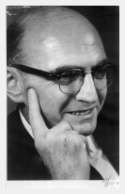Gideon Hausner
Gideon Hausner (Hebrew: גדעון האוזנר, 26 September 1915 – 15 November 1990) was an Israeli jurist and politician. Between 1960 and 1963, he served as Attorney General and was later elected to the Knesset and served in the cabinet.
| Gideon Hausner | |
|---|---|
 | |
| Date of birth | 26 September 1915 |
| Place of birth | Lemberg, Austria-Hungary |
| Date of death | 15 November 1990 (aged 75) |
| Knessets | 6, 7, 8, 9 |
| Faction represented in Knesset | |
| 1965–1974 | Independent Liberals |
| 1977–1981 | Independent Liberals |
| Ministerial roles | |
| 1974–1977 | Minister without Portfolio |
| Other roles | |
| 1960–1963 | Attorney General |
| 1969–1989 | Chairman of the council of Yad Vashem |
Hausner is most widely known for heading the team of prosecutors at the war crimes trial of Adolf Eichmann in Jerusalem in 1961. Hausner is generally credited with exposing the Holocaust to the world in bold cross-examinations of Eichmann, but was criticized for showmanship.[1] His judicial skill also set the precedent that the defense "I was only following orders" is not valid if such orders are wholly criminal and illegal. The prosecution succeeded in proving Eichmann's guilt, and Eichmann was found guilty on all charges, including crimes against humanity and crimes against the Jewish people. He was sentenced to death.
Biography
Hausner was born in Lemberg, then the capital of Galicia, a province of Austria-Hungary (now Ukraine), to Polish-Jewish economist rabbi and Zionist Bernard Hausner, who was later member of Polish Sejm (parliament).[2] He immigrated to Mandatory Palestine from Poland in 1927, when his father took the post of Economic Advisor to the Polish Government first in Haifa and later in Tel-Aviv. Hausner attended high school in Tel Aviv before studying philosophy at the Hebrew University of Jerusalem and then law at the Jerusalem Law School.[3] He spoke Polish, Hebrew, Yiddish, English and German.
He was a member of the Haganah, during the 1948 Arab-Israeli War he served in the Etzioni Brigade. After the conflict he worked as a military prosecutor, and then as president of the military court.
In 1960, he was appointed Attorney General, but resigned from the post in 1963 and pursued a career in politics. He was elected to the Knesset in 1965 as a member of the Independent Liberals, having previously been active in the Progressive Party (the Independent Liberals were a breakaway group of mostly Progressive Party members following the party's merger into Gahal). He was re-elected in 1969 and 1973, and resigned from the Knesset upon being appointed a Minister without Portfolio in 1974 as part of Golda Meir's cabinet. Re-elected in 1977 as the only member of the party, he lost his seat in the 1981 elections when the party failed to cross the electoral threshold.
He was also the chairman of the council of Yad Vashem (1969–1989).[4]
He was married with Judith, they had two children: Tamar and Amos,[5] His daughter is Tami Raveh-Hausner, chairwoman of HaHadashot 12, she is married to advocate Yehuda Raveh.[6]
Bibliography
- Justice in Jerusalem. New York: Harper & Row. 1966.
- Holocaust on Trial (in Hebrew). Tel Aviv: `Am `oved. 1988. ISBN 965-13-0478-2.
References
- Arendt, Hannah (9 February 1963). "Eichmann in Jerusalem". The New Yorker. Retrieved 15 December 2017.
- Hausner, Bernard
- Gideon Hausner: Particulars Knesset website
- Biography
- Gideon Hausner, 75, Dies in Israel; Headed Prosecution of Eichmann
- Yedioth Ahronoth, December 15, 1998.
External links
| Wikimedia Commons has media related to Gideon Hausner. |
- Gideon Hausner on the Knesset website